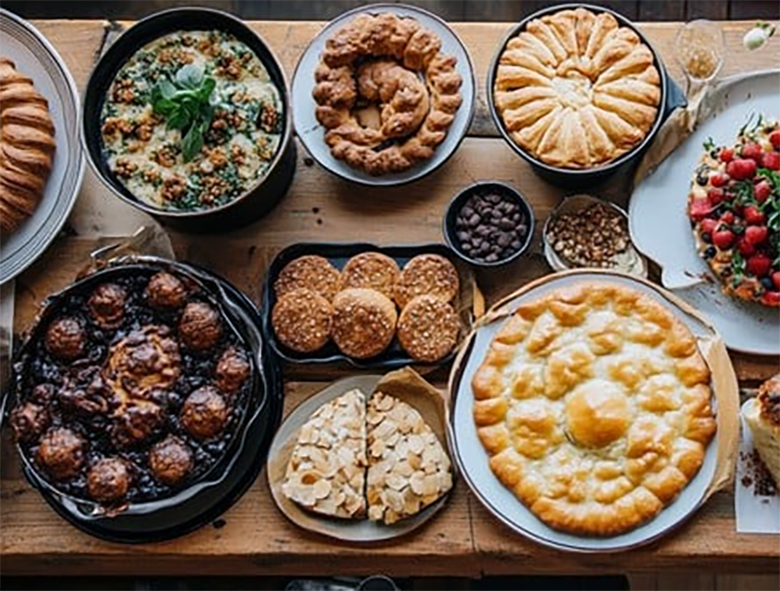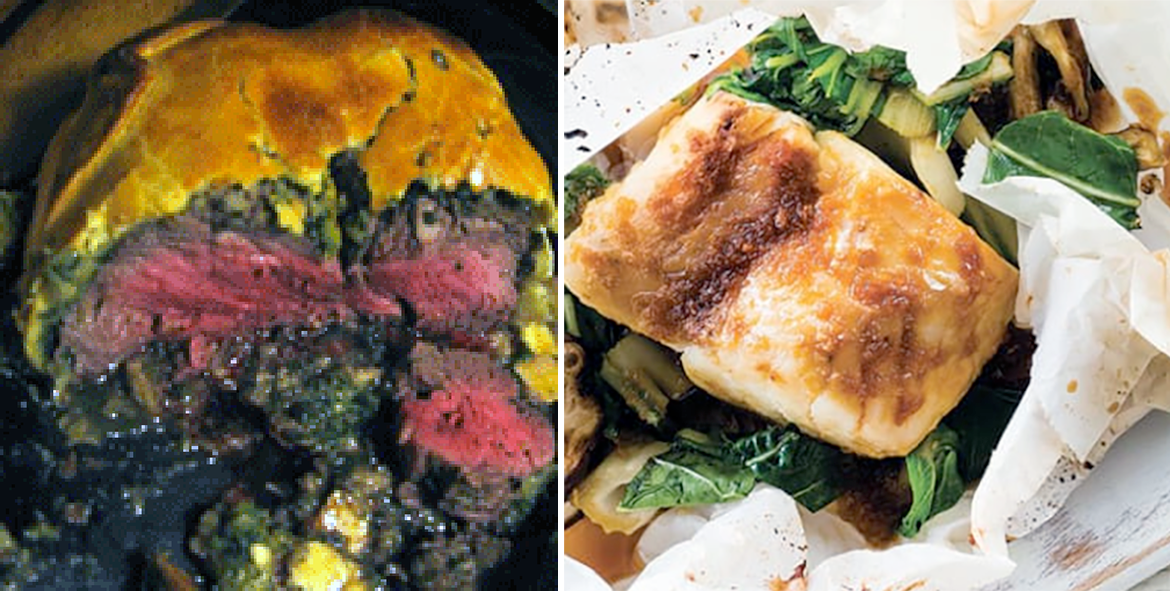FabulousFusionFood's Baking Recipes 17th Page
 A range of baked goods.
A range of baked goods.
Welcome to FabulousFusionFood's Baking Recipes Page — This is a continuation of an entire series of pages that will, I hope, allow my visitors to better navigate this site. As well as displaying recipes by name, country and region of origin I am now planning a whole series of pages where recipes can be located by meal type and main ingredient. This page gives a listing of all the baking recipes added to this site. Baking is defined as a technique for the prolonged cooking of food using dry heat by the action of conduction. Baking is normally done in an oven, but goods may also be baked in hot ashes or on hot stones. Baking differs from Roasting Recipes in that a lower temperature is typically used and the items are cooked for a longer period of time. Baking is a much older process than most people think and foods were probably originally baked in embers or with hot stones (which is how bread may have started). Only later did specialist ovens develop. Though most baked goods tend to be bread or cake-based some other dishes such as pasta dishes and vegetable dishes may also be baked. Stews are often also technically baked in an oven, but are not classed as 'baked goods' in that they are more liquid than solid at the end of the cooking process.
Baking is a method of preparing food that uses dry heat, typically in an oven, but can also be done in hot ashes, or on hot stones. The most common baked item is bread, but many other types of foods can be baked. Heat is gradually transferred "from the surface of cakes, biscuits and cookies, and pieces of bread to their centre, typically conducted at elevated temperatures surpassing 150°C. Dry heat cooking imparts a distinctive richness to foods through the processes of caramelization and surface browning. As heat travels through, it transforms batters and doughs into baked goods and more with a firm dry crust and a softer centre. Baking can be combined with grilling to produce a hybrid barbecue variant by using both methods simultaneously, or one after the other. Baking is related to barbecuing because the concept of the masonry oven is similar to that of a smoke pit.
In addition to bread, baking is used to prepare cakes, pastries, pies, tarts, quiches, biscuits and cookies, scones, crackers, pretzels, and more. These popular items are known collectively as 'baked goods', and are often sold at a bakery, which is a store that carries only baked goods, or at markets, grocery stores, farmers markets or through other venues.
 Beef en croûte (left) and fish en papillote (right).
Beef en croûte (left) and fish en papillote (right).
The alphabetical list of all the baking recipes on this site follows, (limited to 100 recipes per page). There are 2752 recipes in total:
Page 17 of 28
| Mincemeat Strudel with a Medieval Twist Origin: Britain | Mont Blanc Coco Antillais (Antillean Coconut Mont Blanc Cake) Origin: Guadeloupe | Mustacei (Must Rolls) Origin: Roman |
| Mincemeat Tart Origin: Britain | Mont Blanc Coco Antillais (Antillean Coconut Mont Blanc Cake) Origin: Martinique | Mustard Beef with Potato Gratin Origin: Australia |
| Mincemeat, Clementine and Almond Cake Origin: Britain | Mont Blanc Cupcakes Origin: Britain | Mustikkapiirakka (Finnish Bilberry Pie) Origin: Finland |
| Mincepies Origin: Britain | Montrose Cakes Origin: Scotland | Mutton and Potato Pies Origin: Britain |
| Mini Blueberry and Lemon Muffins Origin: Britain | Montserratian Bread Pudding Origin: Montserrat | Mutton and Turnip Pie Origin: England |
| Mini Chocolate Cupcakes Origin: Britain | Montserratian Johnny Cakes Origin: Montserrat | Muufo (Somali Bread) Origin: Somaliland |
| Mini Curried Shepherd's Pie Origin: South Africa | Montserratian Johnny Cakes Origin: Montserrat | Muufo Baraawe (Somali Bread) Origin: Somalia |
| Mini Goat's Cheese and Sunblush Tomato Muffins (Mini Goat's Cheese and Sunblush Tomato Muffins) Origin: Britain | Morning Glory Muffins Origin: New Zealand | My Lady of Portlandàs Mince Pyes Origin: Britain |
| Mini Milk Cookies Origin: America | Moroccan-style Fish and Couscous Parcels Origin: Fusion | Myffins Blawd Ceirch a Mefus Gwyllt (Wild Strawberry Oatmeal Muffins) Origin: Welsh |
| Mini Mincemeat and Cranberry Loaves Origin: Britain | Mortarolo Origin: Italy | Myma (Baked Plaice) Origin: Roman |
| Mini Orange Polenta Cake Origin: Fusion | Morue à la portugaise (Cod with Tomato Sauce) Origin: France | Myrang Aval (Apple Meringue) Origin: Britain |
| Mini Pots of Gold Origin: Ireland | Mother's Day Simnel Cupcakes Origin: British | Myzithropita (Greek Cheesecake) Origin: Greece |
| Mini Victoria Sandwiches Origin: Britain | Moussaka Origin: Greece | Namibian Potbrood (Namibian Pot Bread) Origin: Namibia |
| Mint Chocolate Brownies Origin: American | Mousse de Gibier (Mousse of Game) Origin: France | Namibischer Bananenkuchen (Namibian Banana Cake) Origin: Namibia |
| Mint Chocolate Meringue Cheesecake Origin: American | Moyin-Moyin Origin: Nigeria | Naples Biscuits Origin: American |
| Mint Shortbread Biscuits Origin: Ireland | Mozzarella-stuffed Mushrooms Origin: British | Naples Bisket Origin: Britain |
| Miodownik (Polish Honey Bread) Origin: Poland | Mtedza (Peanut Puffs) Origin: Malawi | Navettes Bretonnes aux fruits rouges (Breton Navettes with Red Fruit) Origin: France |
| Mispelkuchen mit Ingwer (Gingered Medlar Chocolate Cake) Origin: Austria | Mtedza Puffs Origin: Malawi | Nettle and Spinach Cake Origin: Britain |
| Mississippi Mud Cake Origin: American | Mtuza wa Samaki (Baked Curried Fish) Origin: Kenya | Neujahrsbrezel (New Year Pretzel) Origin: Germany |
| Mississippi Mud Pie Origin: American | Mufete de Sardinha (Grilled Sardines with Onion and Chilli Sauce) Origin: Angola | Neujahrspretzel (German New Year's Pretzels) Origin: Germany |
| Mississippi Mud Pie Origin: British | Muffins Orange et Citron (St Clements Muffins) Origin: Saint Pierre | New Orleans Style Pumpkin Pie Origin: South Africa |
| Mitten of Pork Origin: Britain | Mulet Farci à la Saint-Louisienne (Stuffed Mullet in the style of Saint-Louis) Origin: Senegal | New Potato Parcels Origin: Ireland |
| Mkate wa Ufuta (Zanzibar Sesame Bread) Origin: Tanzania | Mulled Wine Cheesecake Origin: Britain | New Year's Eve Meringue Roulade Origin: Britain |
| Mkatra Siniya (Comorian Tray Cake) Origin: Comoros | Mulled Wine Cheesecake II Origin: Britain | New York Cheesecake II Origin: America |
| Modelling Paste Origin: Britain | Mulled Wine Yule Stump Cake Origin: Britain | New York-Style Soft Pretzel Origin: American |
| Moelleux au Chocolat Amande (Chocolate Cake with Almond Topping) Origin: Cameroon | Mulled Winter Fruit Crumble Origin: Britain | New Zealand Fish Pie Origin: New Zealand |
| Moi-Moi Origin: Nigeria | Multi-grain Mix Origin: American | New Zealand Kiwi Fruit Bread Origin: New Zealand |
| Moist Chocolate Sponge Cake Origin: Ireland | Musakhan (Baked Chicken and Onions with Sumac II) Origin: India | New Zealand Meat Pie Origin: New Zealand |
| Molleux chocolat cour de framboise (Chocolate Tarts with Raspberry Filling) Origin: France | Mushroom and Spinach Rustic Pie Origin: British | New Zealand Scones Origin: New Zealand |
| Monkfish Wellington Origin: British | Mushroom Cheese Blintzes Origin: Jewish | Newfoundland Bakeapple Cheesecake Origin: Canada |
| Monkfish with Potatoes, Artichokes and Prosciutto Origin: Britain | Mushroom Cobbler Origin: Britain | Nidi di Rondine (Swallows' Nests) Origin: San Marino |
| Mont Blanc Coco Antillais (Antillean Coconut Mont Blanc Cake) Origin: French Guiana | Mushroom Pie Origin: France | Nigerian Goat Meat Pie Origin: Nigeria |
| Mont Blanc Coco Antillais (Antillean Coconut Mont Blanc Cake) Origin: Saint Barthelemy | Musk Apple Cake Origin: Jewish | |
| Mont Blanc Coco Antillais (Antillean Coconut Mont Blanc Cake) Origin: Saint-Martin | Mussel Pie Origin: Bermuda |
Page 17 of 28